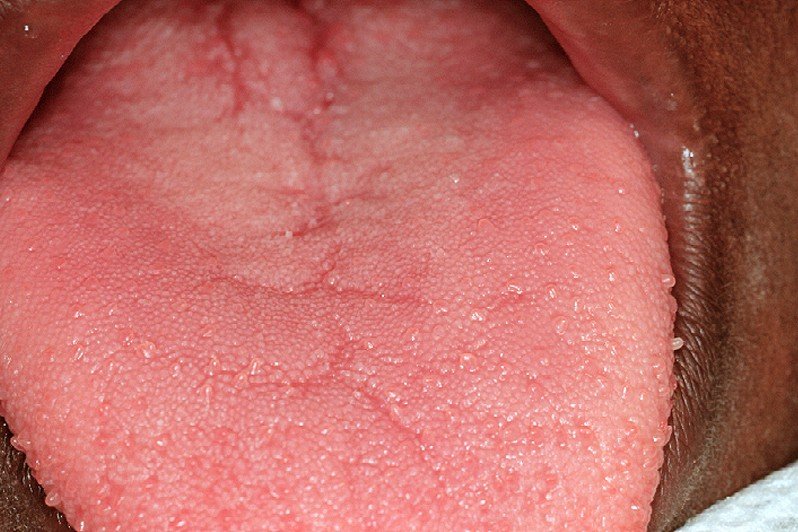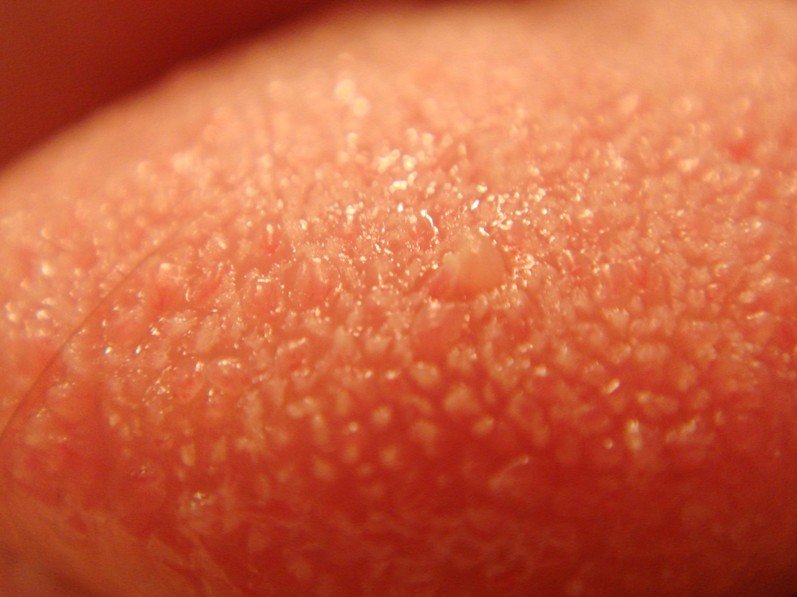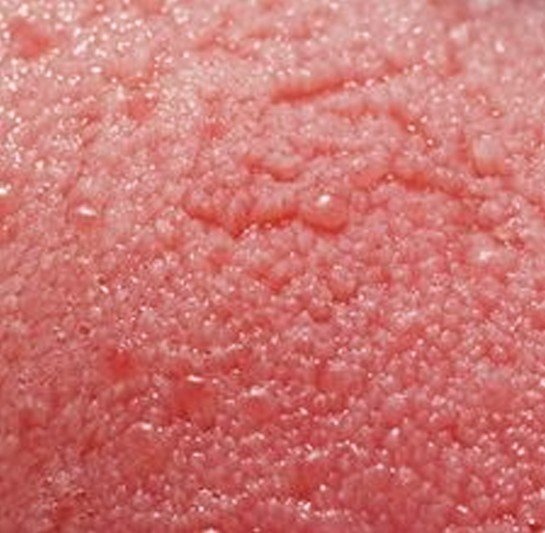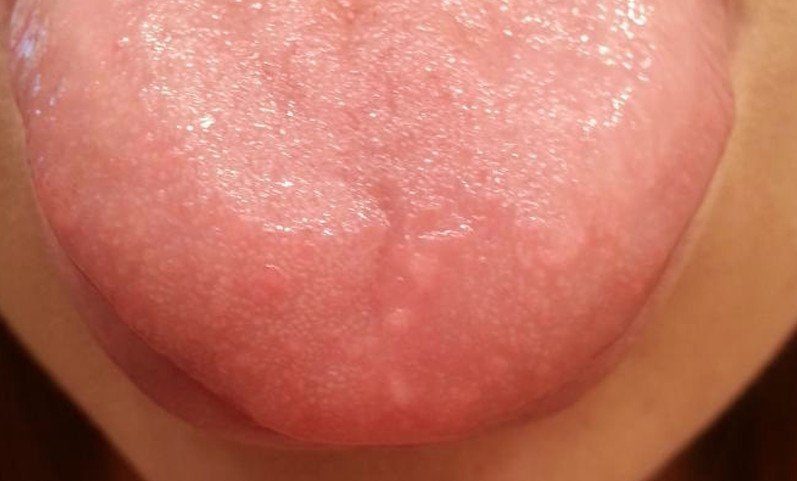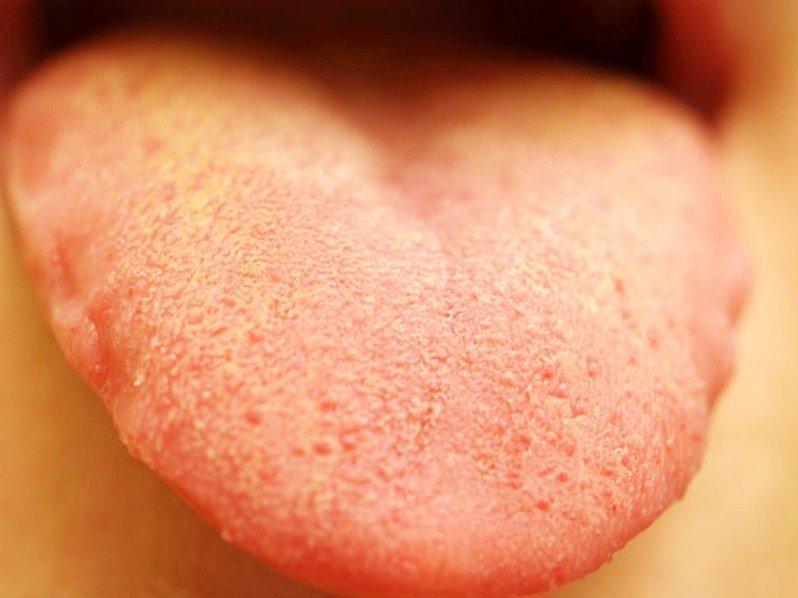Inflamed taste bud
The taste buds present on our tongues are extremely important, as they allow us to explore one of our most essential senses: taste. Between 2000 and 8000 taste buds are present not just on the tongue but also on the surrounding tissues (epiglottis, esophagus, soft palate) and they allow for the experience of four amazing tastes: bitter, salty, sweet and sour. The tip of the tongue is responsible for the sweet taste recognition, the back for the bitter taste and the lateral sides for the sour and salty tastes.
It is important to understand that taste buds can swell and that inflammation can make tasting difficult. An inflamed taste bud can also complicate and necessitate medical attention. These tiny taste receptors are very sensitive to irritating foods and the inflammation can worsen if the proper treatment is not received. Keep in mind that a healthy tongue is pink and not swollen or painful. The numerous taste buds that are present on it swell only when there is an irritation or inflammation.
What does an inflamed taste bud look like?
Upon close analysis, you will notice red or white bumps dotting the entire surface of the tongue. These are inflamed taste buds that have swollen besides their natural dimension and now, when they are enlarged, they are also painful and tender to the touch. All of the four types (foliate, valiate, fungiform and filliform) are red and swollen, causing the tongue to have a specific dotted appearance.
Symptoms of Inflamed taste bud
These are the most common symptoms of inflamed taste bud condition:
- Swollen or enlarged red and white bumps on the surface of the tongue
- Single, painful and enlarged bump on the tip of the tongue
- Pustules resembling inflamed taste buds on the lateral sides of the tongue
- Pain
- Tenderness
- Redness
- Burning
- Tingling
Causes
These are the main causes that can cause taste buds to become swollen and enlarged:
- Spicy foods – these can irritate the surface of the tongue, causing the inflammation of taste buds
- Hot drinks – taste buds are very sensitive when it comes to extreme temperatures (especially those that are high)
- Smoking – tobacco smoke has a negative effect on the sensitive taste buds
- Alcohol – as alcohol has many degrees, it can irritate the surface of the tongue and cause it to become inflamed. This is especially valid if the alcohol consumption is regular and in high quantities
- Food allergies – the taste buds on the tongue will feel that you are eating something you are allergic to and they will trigger an immune response. In more serious situations, one might actually enter into anaphylactic shock, needing emergency treatment (epinephrine or adrenaline injection)
- Acidic foods – these can modify the pH balance in your mouth and thus irritate the taste buds. Citric fruits, seafood and different types of sauces used in Asiatic cuisine can lead to such kinds of irritation of the taste buds
- Canker sores – it is a well known fact that anyone who has canker sores presents an increased risk for other problems in the area, including taste buds inflammation. In many cases, the common problem is a yeast infection
- Vitamin deficiency – if you lack the vitamin B, C or folic acid in your body, then you stand a very good chance to have problems in the oral area, including taste buds inflammation
- Medication – the taste buds are inflamed as a response reaction of the immune system to you taking different drugs. Keep in mind that there are many drugs that can have such side-effects, so be sure to check the label
- Trauma – injuries, lacerations, burns or cuts in the tongue area can also cause the taste buds to become inflamed. As a matter of fact, this is a natural response during the initial trauma phase. The swelling will subside as the lesions heal
- Oral surgery – if you are going to have a laryngectomy performed, then one of the consequences of that procedure is going to be inflamed taste buds
- Chemotherapy and radiotherapy for cancer
- Invasive carcinomas
- Exposure to pesticides and other harmful, chemical substances
- Mouthwash containing harmful, highly powerful ingredients
- Dentures that are not correctly fixed
- Excessive brushing of the tongue
Treatment
These are the most common courses of treatment for inflamed taste buds:
- Gargling with warm, salt water, several times a day. This will help reduce the actual inflammation of the taste buds
- Chew ice chips or apply ice on the tongue for short periods of time. When inflammation is present in our bodies, it is because of the increased blood flow to the area. If you want to reduce inflammation, then ice is more than recommended, as it will decrease the blood flow. Just don’t leave it on for too long or you will have other kinds of circulation problems
- Baking soda is recommended to reduce the inflammation as well
- Honey is indicated because of its anti-bacterial properties
- Fresh ginger, pepper and garlic have anti-septic and anti-bacterial properties, so do not hesitate to consume them separate or mixed, as a decoction
- Glycerin is the best in case of taste bud inflammation due to trauma (lacerations, burns or cuts) but it is also indicated when the inflammation is accompanied by the burning or tingling sensation
- Tea tree oil has anti-inflammatory properties
- Anti-bacterial medication in case of bacterial infections
- Anti-viral medication in case of viral infections
- Anti-fungal medication in case of fungal infections
- Vitamin supplements can solve vitamin deficiencies
- Corticosteroids can be recommended in case of canker sores but the treatment cannot be taken for prolonged periods of time, as there can be serious side-effects
- Anti-inflammatory drugs are recommended when the inflamed taste buds start to resemble pustules (eruptive form), helping not only with the inflammation but also with other symptoms
How to heal an inflamed taste bud?
As you have seen for yourself, there are medical treatments available for the underlying conditions that can lead to the appearance of taste bud inflammation. You need to understand that, until you take the necessary treatment for the underlying condition, you cannot hope for the inflammation on the tongue to subside. So, in case of an infection, you need to take the proper medication. If there is a vitamin deficiency, you need to take vitamin supplements. If there are canker sores, then you need to consider corticosteroids.
Apart from treating the underlying condition, you have a wide range of home remedies that can help with the actual symptoms. Some of them are destined to reduce the inflammation while others are more recommended because of their properties, anti-bacterial or anti-septic. Moreover, if you eat healthy and include plenty of fresh fruits and vegetables into your diet, then the healing process is going to take considerably less. You have to learn to stay away from foods that are bad for you, causing allergies or indigestion, affecting the taste buds as well. The same goes for drinking alcohol in large quantities, smoking and not drinking enough water.
How long does an inflamed taste bud last?
With the proper treatment and self-care measures, this condition will go away before you even imagine it. The one thing that you have to understand is that, in case of an infection, the inflamed taste buds will stay for as long as you have the infection. Once you take the proper treatment for the infection, you can hope for the other symptoms, taste bud inflammation included, to go away. This is why it is extremely important to take your medication and cure the infection.
On the other hand, continuing to eat foods that are bad for you, drinking alcohol and smoking can prolong the healing period of taste bud inflammation. As a matter of fact, this condition might worsen, if you do not start taking the necessary precautions. The same goes for using mouthwash, choosing hot drinks and not maintaining a good oral hygiene. You need to learn how to take proper care of your body and then you will be cured of taste bud inflammation as well. Visit the dentist to fix your dentures, protect yourself from toxic substances and avoid mouth traumas. Keep in mind that prevention is always the best treatment.
Pictures
Some of the collection of pictures of inflamed taste buds…
